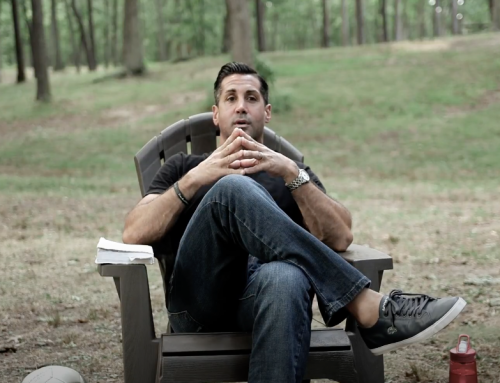by Andrew Sbarra
As a Reading Specialist, I always tell my students that becoming a better reader is a marathon not a sprint, and that achieving your goal is more about the progress and journey than the actual completion of the task. The same principles apply to life.
The problem with life is that it is much easier to start something than it is to complete it because in the real world we encounter setbacks. People make mistakes, get lazy, comfortable, unmotivated, distracted, life gets derailed. Sound familiar? Despite God answering prayers and blessing me abundantly, I frequently encounter one of life’s greatest spiritual attacks, discouragement. There could be no reason for this discouragement, but as if exiting a fog, I find myself in the valley of the shadow of death with no idea how I got here.
When thinking of discouragement and how to handle it, I am reminded of the prophet Nehemiah’s advice to the Israelites. Come chapter four of Nehemiah, the Israelites are set free from their bondage by the Babylonians and allowed to travel back home to Jerusalem. Upon returning they find Jerusalem in disarray. The sight is enough to leave the Israelites in discouragement but instead they are motivated to repair the city. The community decides what they must first do is rebuild the wall surrounding the city so they would be protected from outsiders, and once the wall is completed, they would begin rebuilding the city within. However, soon into the rebuilding process, they grow tired and are intimidated by threats and criticism from the outside nations. This tells me that we can have every good intention to do well and even have what seems to be a wise plan, but conflict will always come. The words of the outside nations is what first brings about discouragement.
Negative words seem to cut the deepest. A big struggle in my personal walk is being very critical of myself, and my abilities, which stems from words of criticism from either my peers or Satan himself. Discouragement only needs a whisper of doubt to derail you from reaching your destination.
“The Israelites worked with great enthusiasm until the wall surrounding the city was half-way completed, “Then the people of Judah began to complain, “The workers are getting tired, and there is so much rubble to be moved. We will never be able to build the wall by ourselves.” (Nehemiah 4:10 NLT)
Focusing on and complaining about life’s difficulties more than addressing them, bondages us to discouragement. My discouragement often begins with isolated instances of disappointment or stresses, but rather than asking God to direct me through them I tend to wallow in them. I complain within my heart and without being aware of it, I surround myself with self-pity rather than Christ; I grow bitter and filled with resentment.
When my family goes away on vacation we often have to have a friend or family member take care of our pets and bring the mail in. What we usually do is give them a key to our home so that they have access to what belongs to us. We would never entrust a key to our home to a complete stranger or someone we think would rob our belongings or not treat what was ours with respect, but that’s figuratively what I do when I focus on complaining. Complaining, self-pity, bitterness, are all doors to our hearts and when we remain there, we are giving Satan the key. When I choose to live my life in consistent complaining or surround myself with complaining, I make myself susceptible to Satan’s attacks by giving him access to what is dearest.
I wonder if you can relate to this, so many times I know that I want to get out of a season of discouragement but I lack the spiritual fervor or energy to do so. When I find myself here, I have to be reminded that I don’t need an inner energy or to have the self–motivation and power to escape discouragement, what I need is Jesus. I am reminded of the words of the apostle Paul, “My grace is sufficient for you, for power is perfected in … with difficulties, for Christ’s sake; for when I am weak, then I am strong” (2 Corinthians 12:10 NASB) and “I am certain that God, who began the good work within you, will continue his work until it is finally finished on the day when Christ Jesus returns” (Philippians 1:6 NLT).
Escaping discouragement requires a shift in action, perspective, and attitude. It is these three factors which Nehemiah presents to the Israelites to turn their setback of discouragement into a comeback for the glory of God.
13 “So I placed armed guards behind the lowest parts of the wall in the exposed areas. I stationed the people to stand guard by families, armed with swords, spears, and bows.
14 Then as I looked over the situation, I called together the nobles and the rest of the people and said to them, “Don’t be afraid of the enemy! Remember the Lord, who is great and glorious, and fight for your brothers, your sons, your daughters, your wives, and your homes!”
15 When our enemies heard that we knew of their plans and that God had frustrated them, we all returned to our work on the wall. 16 But from then on, only half my men worked while the other half stood guard with spears, shields, bows, and coats of mail. The leaders stationed themselves behind the people of Judah 17 who were building the wall. The laborers carried on their work with one hand supporting their load and one hand holding a weapon. 18 All the builders had a sword belted to their side. The trumpeter stayed with me to sound the alarm.
19 Then I explained to the nobles and officials and all the people, “The work is very spread out, and we are widely separated from each other along the wall. 20 When you hear the blast of the trumpet, rush to wherever it is sounding. Then our God will fight for us!”
21 We worked early and late, from sunrise to sunset. And half the men were always on guard. 22 I also told everyone living outside the walls to stay in Jerusalem. That way they and their servants could help with guard duty at night and work during the day. 23 During this time, none of us—not I, nor my relatives, nor my servants, nor the guards who were with me—ever took off our clothes. We carried our weapons with us at all times, even when we went for water.” (Nehemiah 4:13-23 NLT).
The first step that the Israelites had to do, which when we find ourselves discouraged we too must do, is to change what or how we are doing things. Discouragement sneaks its way into our lives, but ultimately, we choose whether we will be discouraged or not. People and circumstances can cause us to feel discouraged but they cannot force us to be. You have to make the conscience decision to not live in self-pity or surround yourself with self-pity, or allow the enemy to wage spiritual war on your soul by allowing him to have a foothold. Or as it says in Ephesians chapter 6, “stand firm.” In the same way, you may be doing something that is good or for the Lord, but if at the end of the day, it is leaving you more tired and discouraged, you may have to change how you are doing that thing. Nehemiah didn’t instruct the Israelites to stop building the wall all-together or simply say, “just keep going, it’s all going to work out.” He, through the divine wisdom of God, gave them a new way of completing the wall and setting themselves in a position to relieve stress and complaints by protecting themselves against their enemies.
Next, Nehemiah told them to remember the Lord. Once we make the decision that something has to change, we need to seek God. Like myself, we may not have the will to make the changes needed, which is why we need to call upon God and allow His strength to guide us towards the changes we know we have to make.
Lastly, Nehemiah tells the Israelites to fight. Declaring that a change has to be made and turning towards God does not mean that discouragement immediately vanishes or that the spiritual attacks will lessen, if anything I have learned that they intensify.
Nehemiah goes on to offer an important anecdote for being able to fight the schemes of the enemy; to do it alongside family. God never intended us to go through life’s hardships alone, and the proof of this is throughout scripture. “Man should not be alone” (Genesis 2:18), “Iron sharpens iron” (Proverbs 27:17), “A cord of three strands is not easily broken” (Ecclesiastes 4:12), “And let us consider how to encourage one another in love and good works, not neglecting to meet” (Hebrews 10:24-25). Having fellow believers standing firm beside you, pray over you, hold you accountable; it is a crucial strategy to defeating discouragement and spiritual attacks.
Trials and seasons of discouragement are inevitable, Christ even tells us this. The ultimate weapon against this, as I keep forgetting, is to surround ourselves with Christ Jesus. When we consider armor and what it is used for, it is meant to surround and protect the vulnerable parts our bodies and to offer a tool or weapon to withstand a fatal blow. When you consider each qualifier of the individual pieces of the armor of God, truth, righteousness, peace, faith, salvation, the word of God, they all reference characteristics of or pseudonyms of Jesus Christ throughout the Gospels.
Through my period of discouragement, I have been able to see my life through the eyes of God’s infinite wisdom. From it, I have been reassured that I am never too far out of the reach for Christ to redeem. As much as discouragement, suffering, and and the consequences of my sins hurt, I am reminded that the war has already been won on the cross, and as long as you belong to God, even death can’t hold you back from living in Christ’s victory.




